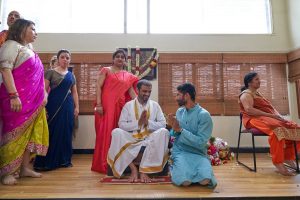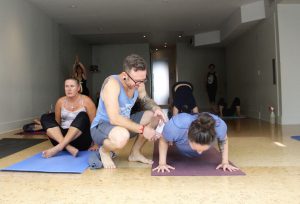The Guru culture in Ashtanga yoga can be pervasive, and I think it’s really interesting.
Not good. Not bad. Interesting.
I’ve seen a lot of stuff on social media lately around the idea of Guru culture, and honestly most of what I’ve seen is negative.
I think the idea of having a “Guru” is quite polarizing. People seem to land on either side of the issue. They either love the idea of having one teacher/guru, or they stand firm in that Guru culture is BS, and rebel completely.
Now guru culture in the Ashtanga lineage is interesting because we have a living breathing Guru, Sharath. And while some people hang on his every word, others… don’t.
So what is the deal with “Guru Culture,” and why are people so against it?
Well, unfortunately there have been many a “supposed Guru” who have taken considerable advantage of their students.
When people hear these stories, I think they struggle with the idea of surrendering to a teacher or guru, for fear that perhaps they too will be taken advantage of. Many people also suggest that they are their own guru. That they have everything within them already, and don’t need to take an external teacher/guru to become enlightened, or even just to learn.
Guru Obsession – The other side of the coin
Ok so the OTHER end of the spectrum, is like complete blind worship of a teacher or guru. People who take a teacher, and place them on a pedestal as if they can do no wrong.i
And as we discussed in this article, your teachers and gurus are HUMAN. They are NOT perfect, and the expectation that they will be is hugely problematic.
I think obsessing over a guru or teacher, is just as dangerous as resisting and rebelling against them all together.
So what’s an Ashtangi to do?

So first we should understand what a Guru is
Guru literally translates to “dispeller of darkness.” Guru is also defined as a teacher, or one who imparts spiritual wisdom and guidance.
Now, I don’t have a statue of David in my living room that I pray to everyday (though I am keen on getting a David Robson bobblehead that says “See you tomorrow” whenever you walk by), but I do see him as my Guru.
Not in a worshippy-he-can-do-no-wrong-he’s-the-perfect-human kind of way.
Not in the way that I blindly follow his every move.
Not in a way that I give up my personal autonomy and power to please or impress him…
Rather, in the way that I really, really respect what he has to say.
In the way that I value his years of experience and trust that he will guide me into the depths of the practice that I just could not achieve on my own; both mentally and physically.
I don’t think that we should blindly accept someone as our teacher or guru without first practicing with them. And I think that perhaps we have this “guru” idea all wrong.

Here are some things I think are really important when taking a teacher/guru:
Trust and Building a Relationship:
Over the years I have built a relationship with David, and as a result I really, really trust him. He is my guru not because I saw some videos of him on Instagram doing a handstand and I thought he looked legit. Not because he’s a Level 2 authorized KPJAYI teacher and that meets the criteria for the type of guru I want.
He is my teacher and I trust him because over the years we have built a trusting student/teacher relationship. I feel safe to tell him when I’m hurting. I trust him enough that if he thinks my body can achieve a certain asana on a particular day, I surrender.
But if ever things start hurting, I feel safe enough in our relationship to say something.
Consistency:
The next thing is consistency. This sort of goes with the first thing on trust and building a relationship.
But I think consistency is what allows me to go deeper in my practice with David. And not just physically, but mentally and spiritually.
David knows me. He knows how my body works. He knows where he can push me, and (albeit annoyingly) he also knows how my mind works. This perhaps, is the part I don’t like so much, but probably the part I need most.
He knows what to say that will push my buttons, in a way that has me reflect. He knows when I’m being lazy, or when I’m actually hurt. And he doesn’t take my shit. (Thanks… I guess).
These are things that can only be experienced through persistent practice over a long period of time with a consistent teacher.
And finally…
Taking Personal responsibility.
I don’t think people like to hear this, but I think it needs to be said. We need to take responsibility for ourselves when it comes to our relationship with our gurus, and teachers.
If something hurts, SPEAK UP.
If you feel uncomfortable in a situation, say something.
Don’t take someone as your teacher or your guru if they don’t respect you enough to listen to you. That isn’t a guru. That is a dictator.
I’m all about surrendering to David. Really, I am. He usually knows what’s best for me, and most of the time I listen; I surrender. But when something doesn’t feel right, I say something. David is a LOT of things, but mind-reader isn’t one of them. So if he’s trying to get me to catch my ankles in a back bend, and it really freakin’ hurts, I say something.

And sometimes, he does things that make me mad at him.
Maybe your teacher does the same thing? And so they should.
He’ll make a comment and I’ll think, “Ugh, what a jerk.” But what I realize later is that he is just a mirror. The things he “does” that piss me off are nothing more than him mirroring back my own BS.
This is why we need a teacher.
Who, if not a teacher, will call us out on our shit?
Who, if not a teacher, will mirror our BS?
Who, if not a teacher, will consistently hold the space for us to deal with our darkest selves, and then shine a light bright enough to show us the way out?
Sure, I come to learn my lessons on my own time, but it’s with the shining light of my teacher that I come to see them.
So maybe we’ve got this “guru culture” all wrong. Maybe it isn’t so much about surrendering our entire being to an external person. Or about placing them on a pedestal, holding their every word as gospel. Maybe we ought to reframe the guru ideology from that of an all-knowing external guru, to that of the sacred, consensual bond that exists between a student and a teacher.

Great article! Gets me thinking about the questions I have around a solo teacher. Do you think this student-teacher bond must be in person all the time or can it happen at a distance?
Hey Monica! That’s a great question. I don’t think my answer is the “truth” but, I think it’s definitely possible to experience a bond with someone at a distance. With the internet, and online courses and videos it’s become easier than ever to get to know teachers and people online. That being said, I think connecting with said teacher in person, even if it’s once a year or so would be ideal. There are plenty of people who have taken Sharathji as their teacher and only see him once a year. I think the student-teacher bond is quite special, and once it’s been established I don’t think distance or time plays much of a factor.
I hope that helps!